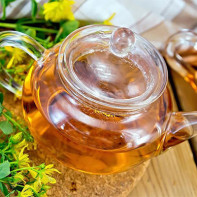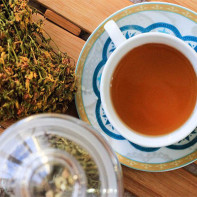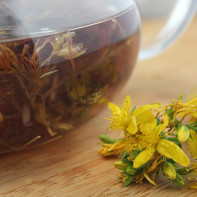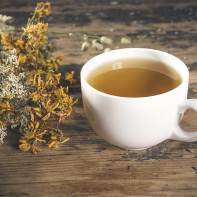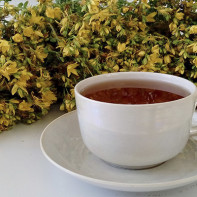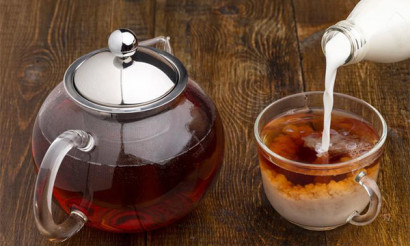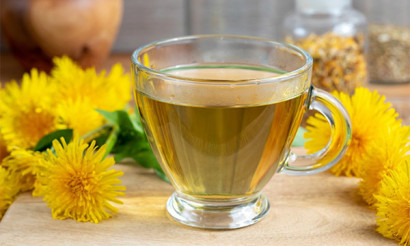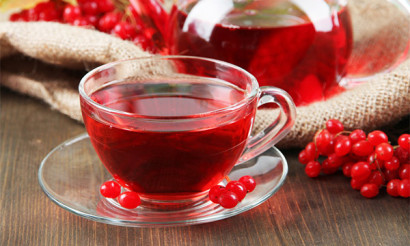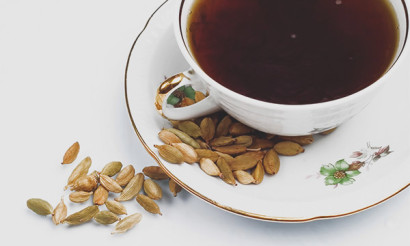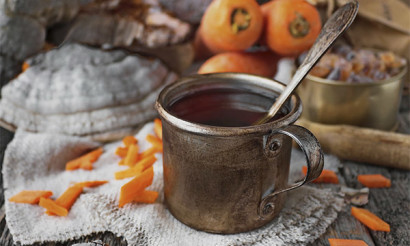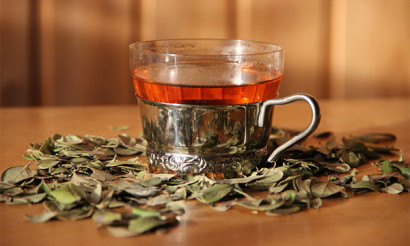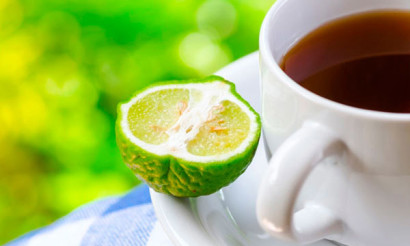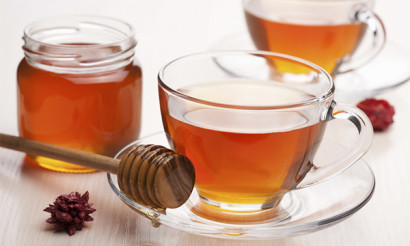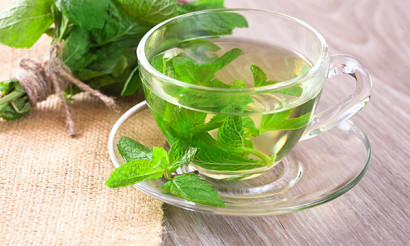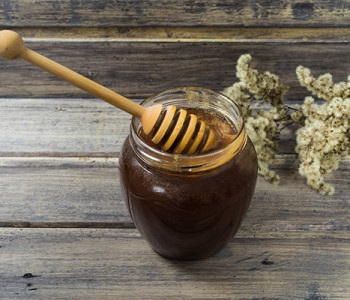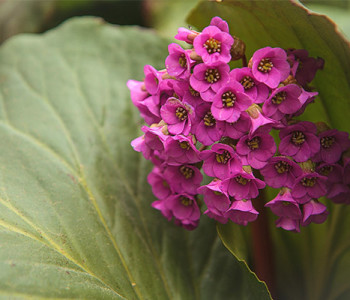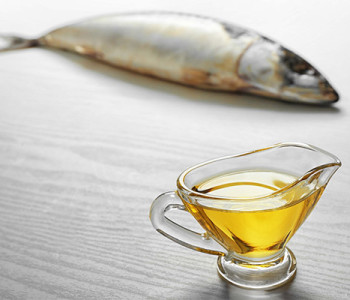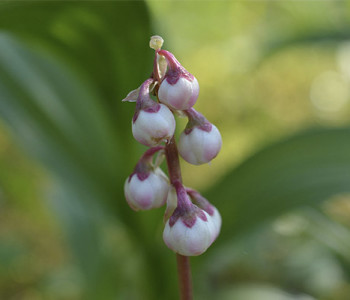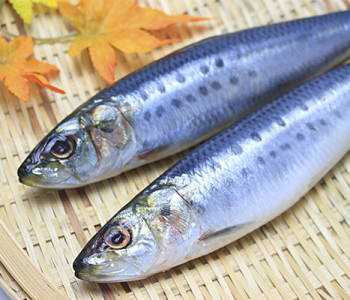Hypericum Tea: Health Benefits
St. John's wort is used both in traditional and in traditional medicine - experts say that this plant is one of the most effective. People call it magic grass, field pharmacy, good blood.
- What is St. John's wort and how it is useful
- Hypericum Composition
- Useful properties of hypericum tea
- For women
- For men
- During pregnancy
- When breastfeeding
- For kids
- When losing weight
- Hypericum tea in medicine
- Harm and contraindications
- When to collect and how to store hypericum
- How to dry
- How to make tea from hypericum
- How to cook butter, broth, tincture of hypericum
- Water tincture
- Decoction
- Tincture
- Butter
- Interesting facts about St. John's wort
It has been proven that St. John's wort can cure almost 100 types of various diseases, we will consider detailed information below. It should be borne in mind that the plant is low toxic, therefore, its use should be approached with caution, preferably after consulting with a doctor first.
What is St. John's wort and how it is useful
The height of the plant is from 70 to 100 cm, the root is thin, there are a large number of branches on the sides. The leaves are oblong, on yellow flowers you can see oily glands, which have the appearance of black dots. It blooms from June to August, it is important to collect the medicinal plant at the peak of flowering, because it is at this time that the highest concentration of substances useful for the body is observed in it. The grass needs to be dried in a dry and dark place.
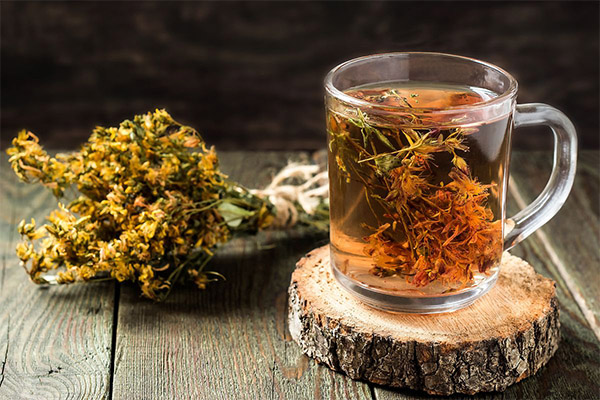
As for useful properties - there are a lot of them, we will consider in detail.
- The grass has an anti-inflammatory, antiseptic effect. Therefore, it is recommended to use it for diseases of the musculoskeletal system, for example arthritis.
- St. John's wort promotes rapid tissue regeneration, it can be used for cuts, wounds - if you need them to heal faster.
- The plant has a diuretic effect. It is indicated for diseases of the genitourinary system.
- Gastrointestinal pathologies can also be cured if used with St. John's wort - you must first consult with your doctor about the dosage.
- If there are problems with the oral cavity: wounds, sores, erosion on the mucous membrane, this herb strengthens the gums, treats stomatitis.
- If a person has severe alcohol intoxication, the plant will have a sobering effect.
- St. John's wort should be used if a person suffers from migraines, neurosis, sleep disorders.
Experts conducted experimental studies that showed: the aqueous extract of this herb strengthens the immune system well, so St. John's wort will be useful to people who are prone to frequent colds, SARS.
Interestingly, in Kazakh, “St. John's wort” means “wound healer.” For external use, plant flowers are very effective. Diluted tincture for alcohol can be used to rinse your mouth (with stomatitis, the presence of ulcers, etc.). It also eliminates bad breath. In the presence of burns, ulcers, wounds on the skin, it is necessary to make compresses based on St. John's wort in order to avoid infection and ensure quick restoration of the skin. They treat purulent inflammation on the skin, abscesses.
Studies have been conducted that have shown that St. John's wort extract can be administered intravenously! Due to this, the amplitude of contractions of the heart increases, blood vessels narrow, and blood pressure rises.
Hypericum Composition
This amazing herb has a large number of medicinal properties, while contraindications are minimized. All this is directly related to the fact that the plant contains many useful components, namely:
- Tannins. They have a pronounced anti-inflammatory effect, have a powerful antibacterial effect.
- Flavonoids. They contribute to the strengthening of capillaries, have a choleretic effect. They have a beneficial effect on intestinal motility.
- Resins They have an expectorant effect, have an antimicrobial, anti-inflammatory effect.
- Vitamins E, B, C and R. Strengthen the nervous, immune, cardiovascular system. Prevent the appearance of malignant tumors.
- Cineol. Indispensable for anxiety disorders, improves sleep quality, helps increase the overall tone of the body.
- Geraniol. The substance is indispensable in the treatment of E. coli, Staphylococcus aureus virus, salmonellosis.
- Alkaloids. Positive effect on the nervous system. They are necessary if a person suffers from neurosis, depression, prone to frequent stresses.
- Mirzen. Its action is aimed at stopping the growth of Pseudomonas aeruginosa.
- Azulen. It has regenerative properties.
- Hypericin. It releases free radicals, due to which the body rejuvenates. It also promotes the formation of new, healthy cells. There is a negative factor - the substance increases UV susceptibility.
- Quercetin and isocvercetin. They constrict blood vessels, have a choleretic effect.
- Hyperoside. Eliminates allergic reactions, helps to reduce the tone of smooth muscles. Effective in edema, and also eliminates inflammatory processes.
- Pinen. The substance is used if there are diseases associated with capillaries, as well as vessels.
- Rutin and coumarin. Effectively strengthens the walls of blood vessels, prevents the formation of blood clots (dilutes blood).
- Saponins. Indispensable as the prevention of atherosclerosis, have a mild laxative and diuretic effect.
As you can see, the plant can really fight with many pathologies. But it is important to remember that it is desirable to use St. John's wort after consulting a specialist, as well as in clear doses, which are indicated in the recipes.
Useful properties of hypericum tea
St. John's wort is a plant that can be found in many medicinal products due to the fact that it has a lot of useful properties for both women and males. But it is important to remember that before using such drugs, you need to make sure that a person does not have an individual intolerance to this herb.
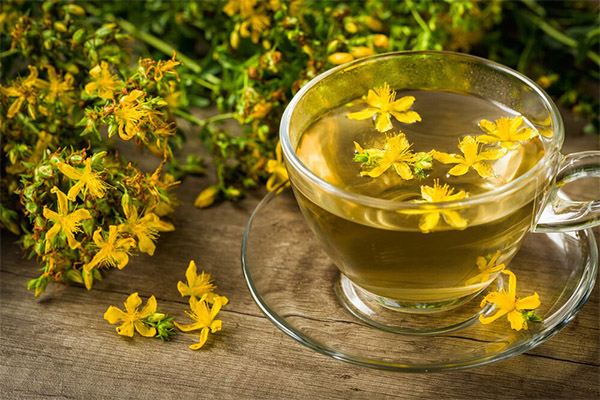
For women
The use of tea based on this plant has a beneficial effect on the condition of hair, nails, and skin. If a woman suffers from acne or skin problems (for example, very oily skin), experts recommend drinking tea based on St. John's wort on a regular basis. As for women's health, it is worth taking a closer look at this plant in such conditions:
- Pronounced premenstrual syndrome - attacks of aggression, tearfulness.
- Climax: helps establish peace of mind.
- Colpitis or vulvaginitis.
- Hormonal problems.
- Inflammation of the uterus.
- Mastitis - St. John's wort helps to get rid of it in a short time, can be applied externally.
- Uterine bleeding - the grass helps to get rid of them, because it has a hemostatic, vasoconstrictive effect.
Do not forget that tea is prepared strictly in accordance with the specified proportions. The plant has a weak toxic effect.
For men
If you are worried about erection problems, then you should definitely try drinking tea with St. John's wort because the herb is considered a natural aphrodisiac. Also for men, tea will be useful in the following cases:
- Fell libido - will help restore sexual desire.
- Erectile dysfunction was diagnosed - the plant activates the blood circulation processes, which ensures a rush of blood to the pelvic organs.
- There are inflammatory processes in the genitourinary system.
- Diagnosed with such a pathology as inflammation of the prostate.
- Frequent stresses, rapid fatigue, which lead to reduced performance.
Of course, it is advisable to immediately consult a doctor if you are concerned about problems in the male part of health. But many reviews indicate that thanks to this grass you can get rid of many problems. It is also important to use it as a prophylaxis.
During pregnancy
Obstetrician-gynecologists claim that women in the position to drink tea based on St. John's wort is not recommended. This herb has not only medicinal properties, there are a number of contraindications to its use. Therefore, even medicines based on St. John's wort are not necessary.
During pregnancy, the hormonal background of a woman changes. St. John's wort also affects hormones, so the likelihood of miscarriage increases.
Such negative consequences may occur if you use St. John's wort during pregnancy:
- swelling
- allergy;
- problems in the development of the unborn child;
- heartburn.
To avoid all these phenomena, do not use St. John's wort for medicinal purposes.
When breastfeeding
As for breastfeeding, there are a number of products that a woman can eat so that the child does not have allergic reactions. St. John's wort is not included in this series, since it changes the taste of milk, and the child will not want to take breasts.
For kids
Experts say that you can use this plant for treatment only after the child reaches the age of 12. Even in this case, a mandatory consultation with a pediatrician is needed first, and it is necessary to carefully prepare infusions and decoctions according to a clearly specified recipe. There is an opinion that plant-based teas tend to treat indigestion and skin diseases. Nevertheless, self-medication in this case is unacceptable.
When losing weight
You can lose weight by taking St. John's wort in the form of decoctions, teas, tinctures. The process of losing weight is carried out due to the fact that this medicinal herb reduces appetite and improves digestion processes. Also, the plant has a calming effect - as everyone knows, during weight loss due to rejection of the usual way of eating, a person experiences stress. Thanks to St. John's wort, overall health can be improved.
Another important point: dramatic changes in nutrition can adversely affect the work of the digestive tract. Decoctions with St. John's wort will help get rid of diarrhea, discomfort, bloating. The following is an effective recipe, thanks to which you can speed up the process of losing weight and at the same time feel great:
- 20 g of grass flowers;
- 500 ml of vodka.
Pour St. John's wort with vodka, send it to a cool dark place for 14 days. After the indicated time, strain the resulting mixture. Take 30 drops per day, diluted in 100 ml of water.
Hypericum tea in medicine
It is interesting that the plant has healing properties due to the fact that it contains essential oil, carotene and vitamin C. The herb is used in both folk and traditional medicine. Due to the fact that it has a lot of useful properties, you can not only prevent, but also cure a lot of diseases.
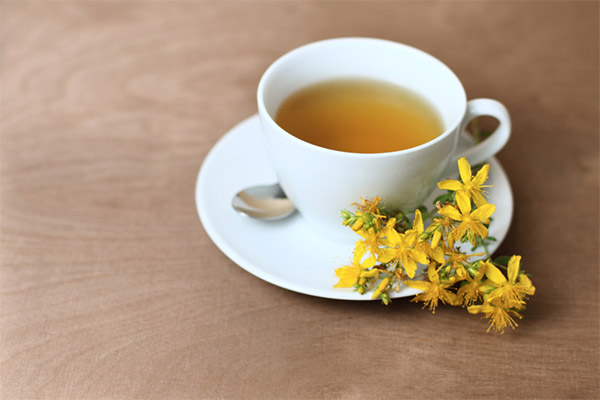
Experts recommend drinking tea after meals, if it is necessary to provide an anti-inflammatory effect, to prevent constipation and discomfort in the gastrointestinal tract.
Scientific medicine suggests using drugs with the addition of St. John's wort orally if a person suffers from neurosis, insomnia, irritability, excessive emotionality. Also, experts often use plant-based tea as an astringent, tonic to strengthen gums.
From hypericum, plant antibiotics are created under the name Imanin and Novoimanin. These are medicines that successfully treat ulcers and burns (even severe forms), remove excess fluid from the body. Thanks to its sedative effect, St. John's wort will be effective even in the case of depressive psychoses.
Traditional medicine recommends its use in viral diseases, arthrosis and other pathologies of the musculoskeletal system (relieves discomfort). With migraines, tea, which is based on St. John's wort, perfectly helps. Traditional healers also offer their patients drink teas for liver diseases, pains or urinary incontinence.
Harm and contraindications
Despite all the benefits of St. John's wort, care should be taken with caution.For example, if you take decoctions or teas based on this plant for a long time, you may experience discomfort in the liver, bitterness in the morning in the mouth. These are clear signs that such treatment should be abandoned for a while.
There are also other nuances that are important to know if a person decided to use this healing plant for therapeutic purposes:
- St. John's wort has the property of increasing pressure, so it is not recommended to use it for people with hypertension.
- Due to the fact that the plant can change the hormonal background, it is important for women to consider this factor when taking birth control pills - effectiveness may be reduced.
- Do not use grass with antibiotics.
- If too long to use infusions and decoctions of St. John's wort to a man, then this can cause problems with potency.
- Persons who have undergone an organ transplant should not use St. John's wort.
- You should not take grass to people with HIV or AIDS - it reduces the effectiveness of antiretroviral therapy.
- In older people, the frequent use of St. John's wort can trigger migraines, sleep problems and anxiety.
- During therapy, it is better to avoid direct sunlight, to avoid unwanted allergic reactions on the skin.
- Too high a concentration of the plant can cause pain in the digestive tract.
This inconspicuous plant really has a huge range of therapeutic properties. But it is important to remember that everything is useful in moderation, as well as cases where such treatment can only aggravate the situation.
When to collect and how to store hypericum
This plant is unique, but in order to achieve a visible effect, it is important to correctly collect, dry and preserve St. John's wort. All parts have healing properties, and many experts argue that for maximum effect it is better to use everything together: flowers, stems, leaves. In this regard, it is worth collecting grass in the form of a whole plant, and not separately.
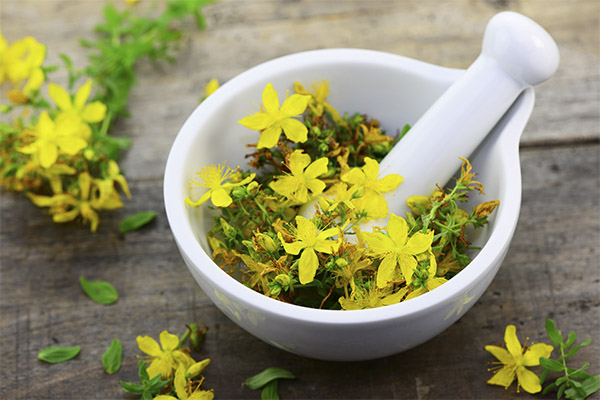
Unpretentious St. John's wort grows everywhere. You can meet the plant in the meadows, in the forests. Large shrubs are extremely rare. Before collecting, you need to carefully study the area - there should not be industrial enterprises, landfills and roads nearby (the plant has the ability to absorb all harmful substances).
For a long time, the grass was considered magical, so the collection was carried out exclusively on the day of Ivan Kupala - it is dedicated to the summer solstice. It was on this day, August 7th, that all plants that were considered magical were harvested. It was believed that then they would be most useful, since nature reaches its peak. If the exact dates are not taken into account, then you need to collect a blooming St. John's wort from mid-June to August.
Do not damage the roots and cut only one plant as a whole. Otherwise, you will destroy St. John's wort and he will no longer grow in this place.
We outline the most important points:
- Collection should be carried out only in ecologically clean places.
- The best time to collect grass is from June to August, but St. John's wort must bloom.
- It is better to cut only branches, the maximum length is 35 cm.
- You can not completely cut off the entire bush so that the plant does not die.
In storing hypericum, it is also important to observe some nuances. If the bush dries well, it will be fragile and brittle. Therefore, many recommend putting bundles in bags of cotton fabric, and then bandaging them with a rope.
Another option: chop the grass, break it into small pieces and put it in jars of plastic or glass. Store the already dried plant in a dry, dark place. A kitchen cabinet with doors will do. If all storage conditions are correctly observed, then the grass will fully possess its healing properties for 3 years.
How to dry
The best option, if you need to preserve as many healing qualities as possible, is drying outdoors, without using all kinds of heating devices. To do this, put St. John's wort into bundles (small sizes), tie them with a rope, hang flowers down. The most important thing is that the sun does not fall on the plant. The room should be well ventilated, dry. A barn or attic will do.
There is another method of drying plants. The branches need to be carefully laid out on paper in one layer. They need to be turned over periodically. Parchment is best used as a backing. You cannot put St. John's wort on a newspaper - a medicinal plant absorbs paint, it is toxic and can harm the body.
It is convenient to dry the grass in mesh bags. It should be placed in small portions in a bag, after which it should be hung in a well-ventilated, dark place.
If you choose a natural method, then the raw material will be ready in about 20 days. In very dry and hot weather, it is halved - 10 days will be enough.
Alternatively, some people use an electric dryer. But in this case, it is very important that the temperature regime is observed - no more than 40 degrees. If the electric dryer is not equipped with a thermostat, then this option will have to be abandoned, since the grass will lose all its useful properties.
How to make tea from hypericum
Making tea from this medicinal plant is the most common method of preparation. Consider how to properly carry out the procedure in order to maximize all useful properties.
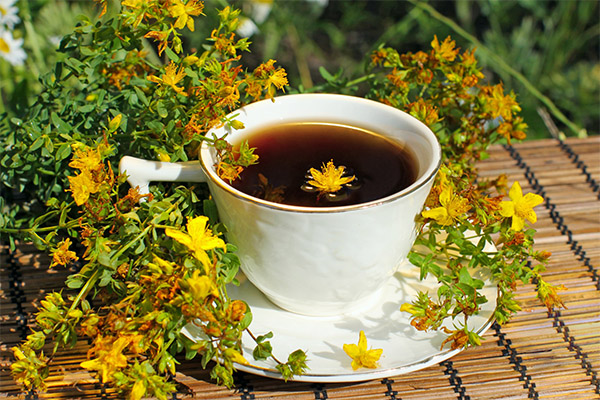
Prepare a porcelain teapot in advance. Pour 10 g of crushed grass there, pour 100 ml of boiling water. Insist for 5 minutes, strain. Next, the resulting broth is diluted with hot water in a ratio of 1: 3. If desired, honey or sugar can be added to the broth. You can’t drink strong tea. This can lead to undesirable allergic reactions. Repeated welding can not be used. If desired, St. John's wort is admissible to mix with different herbs, except for mint - otherwise you can harm the kidneys.
Consider a few more variations of teas if you have health problems:
- Cold. It will take 1 tsp. St. John's wort, 1 tsp sage, 1 tsp oregano, 0.5 tsp thyme, 0.5 tsp eucalyptus. Mix everything. Add a mixture of herbs to black tea and cook like a regular drink.
- Pain in the epigastric region. In equal proportions, mix St. John's wort, nettle, meadowsweet. 8 tbsp pour the resulting mixture with a liter of boiling water, insist for an hour.
- With menopause (if a woman suffers from neurosis against this background). In equal proportions mix St. John's wort, lemon balm, hops. 2 tsp mix the mixture with 250 ml of boiling water. A day to get a positive result, it will be enough to drink 130 ml of the drink.
- Liver disease. Mix equal amounts of St. John's wort, chicory, yarrow, horsetail. 1 tbsp mix the mixture with a glass of boiling water. Insist for 30 minutes.
- Gastritis and prevention of gastrointestinal diseases. In equal amounts, St. John's wort, nettle, and meadowsweet are needed. 6 tsp pour 250 ml of boiling water into the mixture, leave for 20 minutes.
- Cystitis, pyelonephritis. St. John's wort, linden, calendula, licorice, chamomile - take all herbs in equal amounts. A glass of boiling water will need 1 tbsp. mixtures. Take 1 ml 3 times a day before meals.
How to cook butter, broth, tincture of hypericum
Of course, making tea based on this medicinal plant is the easiest option. But not only teas are popular among lovers of homeopathy, there are many more variations in the preparation of medicinal mixtures with the addition of St. John's wort. Let's consider them in detail.
Water tincture
It is used for high acidity, gastritis, cystitis.It can be prepared as follows: pour 30 g of dry grass in a glass of boiling water. Insist 4 hours in a dark place. After filtering, clean in a cold place. Take 1 tbsp. 3 times a day before meals.
Decoction
60 g of St. John's wort pour 250 ml of boiling water, simmer for about 1 hour in a water bath or over low heat. After the broth has cooled, strain. Take with cystitis, gastritis, stomatitis. It is also recommended to be used as a prophylaxis of intestinal infections and other diseases of the gastrointestinal tract. You can also cure sinusitis - rinse the sinuses of the nose with a decoction 3 times a day. It is also worth preparing a concentrated broth for the treatment of alcohol dependence. The cooking method is as follows: take 5 tbsp. dry hypericum, insist on 500 ml of boiling water. Take 3 tbsp. twice daily before meals. The course of treatment is 2 weeks, if necessary, it is extended. Before starting therapy, it is advisable to consult a doctor to make sure that the patient does not have an individual intolerance to the plant.
Tincture
You need to cook on the basis of alcohol or vodka. The recipe is: mix 1 part of the healing herb and 7 parts of vodka, leave in a cool dark place for 4 days. Before use, be sure to dilute with water - 1 tbsp. 50 ml of water. You can rinse your mouth, do warming compresses. This is an excellent remedy for people who often suffer from colds.
Butter
Also an effective tool that is suitable for rubbing, cosmetic purposes (nails, skin, hair). To prepare the product, you need to insist St. John's wort on any of the vegetable oils - olive is best. Important: you need to use raw materials only in fresh form. Consider several ways to prepare oil based on this medicinal plant.
- From the flowers. Put them tightly in a jar, pour refined olive oil. Cork and place in the sun. Insist a month, while it is important to mix the mixture regularly. After squeezing twice, drain into a bottle.
- From the grass. Pour small fresh grass of St. John's wort in an amount of 0.5 kg with any refined sunflower oil (1 l). Add 0.5 l of dry white wine, mix. Pour the mixture into a jar, cork. Insist 3 days. Then hold the mixture for 2 hours in a water bath, reseal the jar and leave for 3 weeks. After the time has passed, strain. Keep refrigerated.
Interesting facts about St. John's wort
At first glance, this is ordinary, unremarkable grass. In fact, everything is not so simple, many interesting things can be said about this plant, which no one even guesses about.
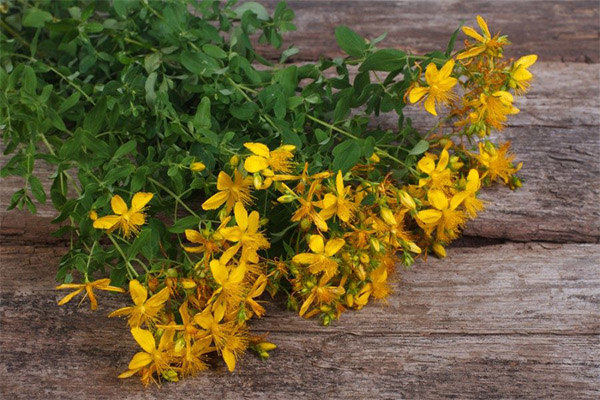
In total, there are about 500 species of St. John's wort in the world. To extract maximum medicinal properties, the grass is harvested only after the buds appear on it. Another name for the plant is bloodthirsty. This is due to the fact that if you rub the grass between the palms of your hands, it becomes red.
There is a popular belief that a plant can cure 99 ailments, and many are sure that it can save a person from magic, evil spirits. Previously, it was possible to collect the plant exclusively to herbalists - only they knew where to look for St. John's wort, how to cut it. Young girls were sure that if you drink a drink with the addition of herbs, you can quickly and successfully get married. Even houses were fumigated with St. John's wort accompanied by prayers to protect their home from evil spirits.
Interestingly, the plant is also valued in the field of cosmetology. St. John's wort helps to get rid of excessive oily skin, acne, various rashes. Using it is simple: St. John's wort decoction in the form of cubes and wipe your face every morning. Regular use of the plant helps strengthen nails and hair. St. John's wort oil will be useful when taking a bath: literally a couple of drops will calm and refresh a tired body.
But this is not all interesting facts:
- St. John's wort extract has a powerful sedative effect, so it is added to many drugs for depression.
- If a person has an anxiety disorder, the plant will have the same effect as many pharmacological drugs in the antidepressant group.
- Many drugs that are recommended for women in menopause, as well as PMS, contain this healing herb.
- The plant perfectly fights migraines and chronic fatigue. Another scientifically proven fact: St. John's wort is used as a tool that facilitates the treatment of drug addiction.
- If we compare the preparations based on St. John's wort with traditional medicines, the former practically do not give side effects and are not addictive.
As you can see, St. John's wort is a truly amazing plant, despite its unremarkable appearance. The main thing is to remember: measure is important in everything. Be healthy!
«Important: all information on the site is provided exclusively in fact-finding purposes. Before applying any recommendations, consult with a profile specialist. Neither the editors nor the authors are liable for any possible harm caused materials. "

